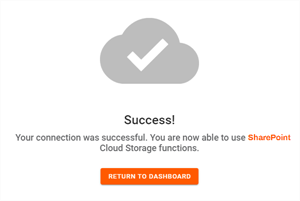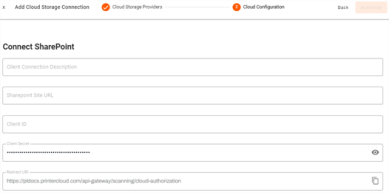We've Moved!
We've unified our Vasion Print (formerly PrinterLogic) and Vasion Automate documentation into a single, streamlined resource to better serve you. Visit our new unified documentation site: docs.vasion.com
Note: This legacy site will not be updated after January 6, 2025, and will remain available for reference until May, after which all traffic will automatically redirect to docs.vasion.com/a/Get_Started/Automate.htm.

Last updated: January 07, 2025
Connect SharePoint
SharePoint Connection Requirements
To connect Vasion Print (formerly PrinterLogic) to SharePoint you need the following:
- A new app registration in the Microsoft Azure Portal.
- Client Secret and Secret ID strings.
- In SharePoint, create one or more folders for the scan destinations.
Add a New Connection
Vasion Automate has a 15 min inactivity timeout. Please be aware that the inactivity timeout applies to the Global Scan Settings screen
- In the Admin Console, select Tools
 Settings
Settings  Scanning.
Scanning. -
For Scan to Cloud (CPA), select the Scan Settings drop-down and enable the toggle for Enable Scanning with Printer Default Settings. If they're not already configured, you can configure the settings later.
- For Mobile Scan / Scan To Cloud (CPA), select the Cloud Connections drop-down and select Add Connection.
- Select Microsoft SharePoint, and select Next.
Leave the browser page open on Connect SharePoint.
Open a new browser page to register the application and create Client Secret details on the Microsoft Azure portal.
Create a New App in Azure
App Registration
- Navigate to https://portal.azure.com/.
- From the Azure services section, select App registrations.
- Select New registration and complete the necessary steps in the Register an application page.
- Give your app a name.
- For the Supported account types, select the Multitenant option.
- For the Redirect URI select Web.
- Copy the Redirect URI from the Connect SharePoint page and paste it on the text field next to the Web drop-down.
- Select Register.
Create a Client Secret
- From the side navigation expand the Manage section and select Certificates & Secrets.
- Select New client secret.
-
In the Add a client secret panel enter a description and select an expire date.
Remember to renew the client secret before it expires, or the Scan To Cloud will not be able t connect to the drive after the expiration date.
- Select Add from the bottom of the panel.
-
Copy the string under the Value column and paste it into the Connect OneDrive page in the Client Secret field.
Make sure you copy the Client Secret value and save it or paste it into the appropriate field. This value is only visible immediately after creation and is hidden once you navigate away from the page.
Add App Owners
- Select Owners from the side navigation.
- Select Add Owners.
- In the Owners panel check the box next to any users you want to designate as owners for the app.
- Use the Select button at the bottom of the panel to save the select users as owners.
Grant API Permissions
The SharePoint connection requires both Microsoft Graph and SharePoint API permissions.
- Under the Manage section on the left-side navigation select API Permissions.
- Select Add a permission.
- In the Request API Permissions panel, select Microsoft Graph.
- Select Delegated Permissions, and select from the following.
- In the OpenId permissions section, select offline_access.
- Scroll down to the Files section and select Files.ReadWrite.All.
- Scroll down to the Sites section and select Sites.ReadWrite.All.
- Scroll down to the User section and make sure User.Read is selected.
- Select Add Permissions and close the panel.
- Select Add a permission.
- Scroll down and select SharePoint.
- From the AllSites section, select AllSites.FullControl.
- From the MyFiles section, select MyFiles.Write.
- From the Sites section, select Sites.SearchAll.
- Select Add Permissions.
- Select the Grant admin consent for MSFT option.
- Select Yes in the pop-up modal.
Leave the current browser page open. You will need to copy some values from the Azure portal into the SharePoint Connection page.
Create a SharePoint Site
- In a new browser tab, browse to Office 365 SharePoint and sign in.
- Select Apps in the left menu.
- Search for SharePoint and select it.
- Select an existing site. You can select +Create Site to create a new site for this connection.
- Copy the site URL from the web browser address bar. Ensure you only include the URL up to the site destination. Example: https://company.sharepoint.com/sites/MySite
Leave the current browser page open. You will need to copy some values from the Azure portal into the SharePoint Connection page.
Connect SharePoint
Return to the Connect SharePoint page and complete the following:
-
Client Connection Description — enter a description for this configuration.
This description is displayed in the Cloud Connections section and the Preset Scan Locations Cloud Drive tab.
- SharePoint Site URL — paste the site URL you copied from the SharePoint site page.
- Client ID — go to the Azure page and copy the Application (client) ID and paste it here.
- Client Secret — If not already done, paste the Client secret Value string here.
- Select Authorize.
- Select the account you want to use to connect to Microsoft. Ensure it's an administrator account and that it belongs to one of the app owners.
- On the Permissions Requested modal, select Accept.
-
After the connection is verified successfully, select the Return to Dashboard option.
For customers using Scan To Cloud and Mobile Scanning. You are now ready to continue to adjust any global scan settings, add preset scan locations and install Scan To Cloud (CPA). Go to Scan to Cloud for complete details.
-
Week Ending In Jan 4th, 2025
-
Released: Dec 27th, 2024
-
Released: Dec 23rd, 2024
-
Android/iOS: Dec 23rd, 2024
-
Released: Dec 9th, 2024


